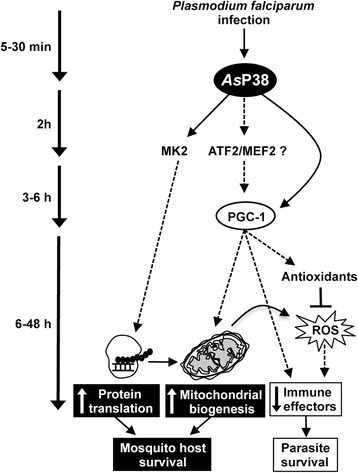Fig. 11.

Model for AsP38 MAPK driven tolerance to Plasmodium infection. Malaria parasite infection in A. stephensi increases AsP38 phosphorylation in the midgut epithelium leading to the activation of transcription factors that drive expression of proteins involved in glycolysis, mitochondrial biogenesis, and protein translation, which results in enhanced energy efficiency and protein synthesis. Activation of AsP38 enhances the synthesis of antioxidant enzymes, which reduce damage due to oxidative stress, but which also contribute to decreased ROS-mediated immune gene activation. Together, these processes increase mosquito host survival in the context of parasite development and transmission
